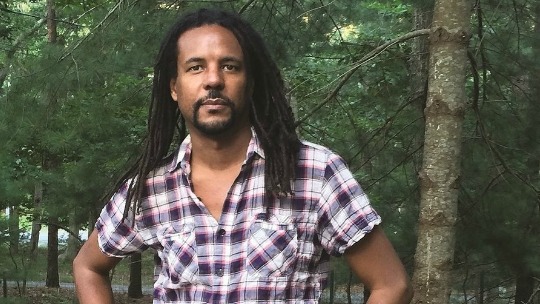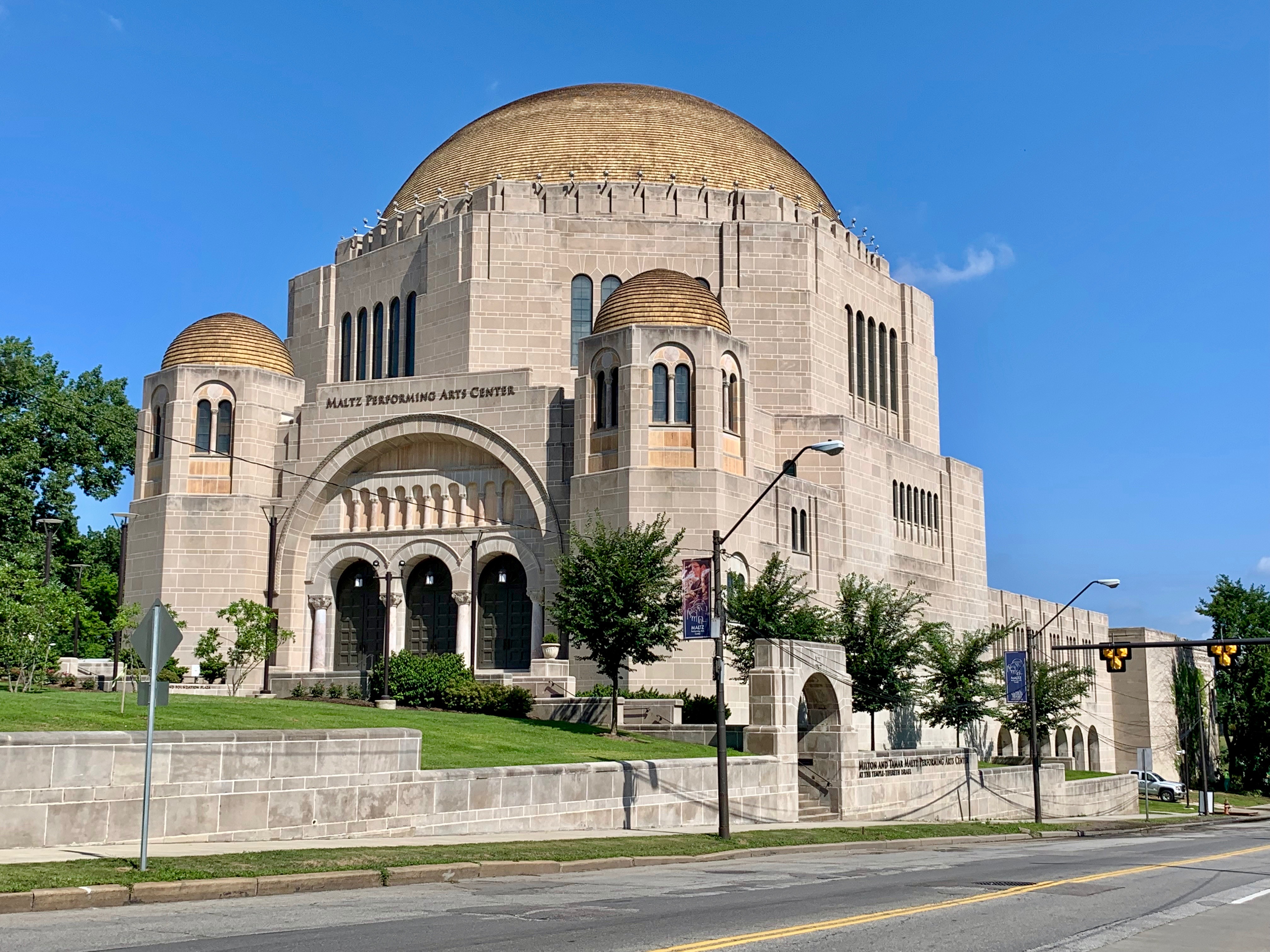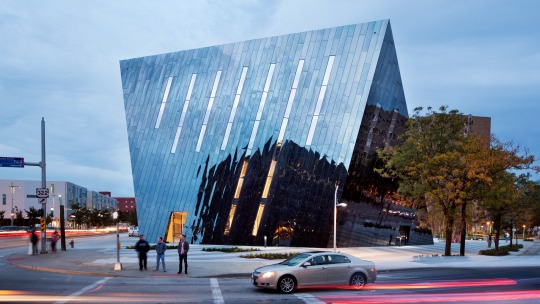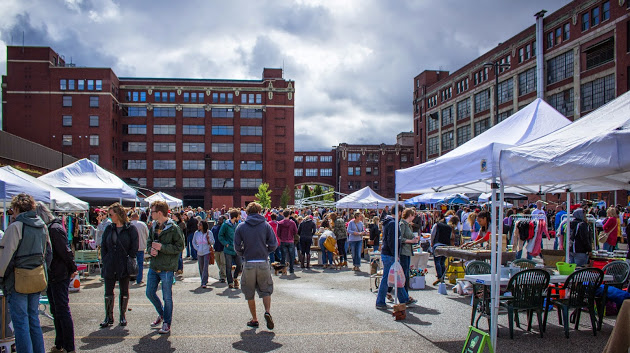by Charles Ellenbogen
Every once in a while, someone comes along – think Garrison Keillor, Richard Pryor, Spalding Gray – who defies any of our conventional notions of genre, so something has to be invented for them. Meet the newest member of the group – Tyehimba Jess.
Jess, who this spring won both an Anisfield-Wolf Book Award and a Pulitzer for poetry, has definitely written a book that contains pieces that seem like poetry, but even that term, as expansive as it is, seems limiting here. This book also contains artwork, posters, interviews, music (the Fisk Jubilee Singers) and history. This book is so full of life that at more than 200 pages, I still never wanted it to end. Even Jess’ author notes are marvelous.
We meet Scott Joplin, Henry “Box” Brown and Booker T. Washington, among others. But I think the most memorable character is Wildfire and the account of her introduction to academic and community life in Oberlin, Ohio, and her brave and bold exit. In this untitled poem, Jess brings us gently, even optimistically, into Wildfire’s new surroundings:
“1862. Wildfire lay not far from the campus of Oberlin, where her older brother had sent her to learn how to mold herself into a brown survival of whiteness.”
In addition to the searing phrase “a brown survival of whiteness,” the use of the word “mold” here seems deliberate, to connect to the previous poem, “Forever Free,” which is about the work of the sculptor, Edmonia Lewis.
“Forever Free”
What a thing it is
to be delivered
from beneath
the dirt,
from hardship’s rubble,
from underneath
the feet
of the world.
To raise up
on one’s own pedestal
and become
bondage’s living
tombstone.
Like most great literature, Olio makes me want to read more (a biography of Scott Joplin that Jess includes in his bibliography), see more (the sculpture of Edmonia Lewis) and listen more (I’ve been playing ragtime in my car since I started this book).
I can’t wait to hear him present his work in September, as a part of Cleveland Book Week.
Friday, September 8
Tyehimba Jess, 2017 Anisfield-Wolf Award Winner, poetry, Olio
5:30 p.m.
Karamu House
Charles Ellenbogen teaches English at John F. Kennedy – Eagle Academy in the Cleveland Metropolitan School District.
For a second year, Cleveland becomes a national literary destination during Cleveland Book Week, an extended celebration of books and the people who love them.
“Clevelanders will find all kinds of alluring on-ramps this year,” said Karen R. Long, manager of the Anisfield-Wolf Book Awards. “We’ve aligned with MOCA’s Art Book & Zine Fair and renewed our partnerships with Cleveland Flea and Public Square. We’re heading into a memorable bibliophilic week.”
From September 5-9, join us as we read, listen, gather to discuss books and ideas and hear from some of the best authors in the world, including all five 2017 Anisfield-Wolf award recipients, plus past winner Colson Whitehead.
Cleveland Book Week Schedule
Tuesday, September 5
Cleveland Book Week Launch
Public Square
11 a.m. to 2 p.m.
Gather on Public Square with community partners and local literacy advocates. Meet storytellers, eat free ice cream, pick up a free book and enjoy the Square.

Wednesday, September 6
Peter Ho Davies, 2017 Anisfield-Wolf Award Winner, fiction, The Fortunes
4:30 p.m.
Baker-Nord Center, Case Western Reserve University
No tickets required
The Fortunes is a novel “examining the burdens, limitations and absurdity of Asian stereotypes.” CWRU’s Thrity Umrigar and Lisa Nielson will be in conversation with Davies about his ground-breaking book.

Wednesday, September 6
Colson Whitehead, Writers Center Stage
7:30 p.m.
Maltz Performing Arts Center
Get tickets
Whitehead, who last year wrote the blistering, best-selling novel The Underground Railroad, returns to Cleveland to kick off the new season of Writers Center Stage, presented by the Cuyahoga County Public Library Foundation. He is the author of six remarkably distinct books, including John Henry Days, for which he received the Anisfield-Wolf Book Award in 2002.

Thursday, September 7, 2017
82nd Annual Anisfield-Wolf Awards Ceremony
State Theater in Playhouse Square
6 p.m.
Join us and our esteemed jury chair Henry Louis Gates Jr. in the historic State Theater in Playhouse Square. Our ceremony will anchor Cleveland Book Week, with more than 1,500 people expected to attend. Watch this year’s livestream at www.anisfield-wolf.org/live-stream.

Friday, September 8
Margot Lee Shetterly, 2017 Anisfield-Wolf Award Winner, nonfiction, Hidden Figures
10 a.m.
Waetjen Auditorium, Cleveland State University
Get tickets
This free, student-focused event partners with Cleveland Metropolitan School District to present Shetterly in conversation with students, discussing how her 11-year-old research into this “unseen” story became a juggernaut, riding atop the bestseller and box-office lists across the nation.

Friday, September 8
Isabel Allende, 2017 Anisfield-Wolf Award Winner, Lifetime Achievement
Noon
The City Club of Cleveland Friday Forum
Limited tickets available – call 216-621-0082 for information
Isabel Allende—novelist, feminist and philanthropist—is considered the most widely read writer working in Spanish, having sold more than 67 million books. She will talk about life, work and politics and take questions in the traditional City Club of Cleveland style.

Friday, September 8
Karan Mahajan
Live on Professional Book Nerds Podcast
1 p.m.
Cuyahoga County Public Library, South Euclid-Lyndhurst Branch
Get tickets
Join a live audience and bring your questions for breakout novelist Karan Mahajan, 31, as he discusses his incendiary second book with Jill Grunenwald and Adam Sockel, hosts of the Professional Book Nerds podcast. The New York Times named The Association of Small Bombs one of the ten best books of 2016.

Friday, September 8
Tyehimba Jess, 2017 Anisfield-Wolf Award Winner, poetry, Olio
5:30 p.m.
Karamu House
Get tickets
Anisfield-Wolf juror Rita Dove declared herself wowed by the “roller-coaster mélange” in Olio, Jess’ second book of poetry, which reclaims African-American voices from the Civil War to World War I. It also won a Pulitzer Prize. Jess will bring his work to life on stage at Karamu House.

Friday + Saturday, September 8-9
MOCA Cleveland BOUND: Art Book + Zine Fair
Museum of Contemporary Art Cleveland
This fair brings together the most creative zinesters, comic creators, photomakers and independent publishers to share and sell their work, often from the margins of the mainstream. In addition, BOUND will include live music, DJ sets, workshops and artist talks. MORE INFO.

Saturday, September 9
The Cleveland Flea: Cleveland Book Week Edition
9 a.m. – 4 p.m.
3615 Superior Avenue
The Cleveland Flea is a creative business incubator that draws thousands each month to lesser-known Cleveland neighborhoods. Look for our pop-up bookshop and literary cafe, where you can sample coffee and cocktails while browsing rare books and first editions of mingling with some of Cleveland’s authors. MORE INFO.
The Lavender Graduation is an annual celebration that occurs on numerous campuses across the country, where graduating lesbian, gay, bisexual, transgender, queer and allied students are formally recognized and celebrated for their accomplishments. Last month, Anisfield-Wolf SAGE Fellow Lisa Nielson was honored during Case Western Reserve University’s ceremony with the Prizm Award, which honors faculty and staff members significant contribution to the LGBTQ+ community. Her acceptance speech is reprinted here with permission.
In thinking about what I wanted to say this evening, I naturally gravitated to my identity as a teacher and scholar. To be effective as both, one also needs to be a storyteller. We connect to information and one another through our own experiences and the shared experience of learning. As a result, I see my role as not only teaching content, but to help students read, write and speak critically, and through that process enter the broader world conversation through their own stories. Apparently, my superpower is also to inspire guilt so they write their papers.
The stories I usually tell are funny, peppered with anecdotes about the colorful members of my family. I grew up in the LGBT community and the gay rights movement of the ’80s and ’90s. Whenever I enter a room and say “We’re here, we’re queer, get used to it,” my students chuckle. Yet, when they ask me about my history and experiences, I give them a true but often carefully curated answer. I don’t want them to be discouraged by the dark things. What it meant to be raised by a mentally and physically disabled, queer, single parent.
At the recent “Faces of Immigration” program put on by the Muslim Student Association, I decided to tell a few of the other, less funny stories. After, one of my former students asked why I didn’t do that more often, as hearing my experiences might help students connect to the material I teach, and me. It never occurred to me they would want to know, or if it would even be appropriate to tell them.
My activist parents raised me to believe that gender was relative and everyone is bisexual. I didn’t know other people weren’t bisexual or didn’t believe the same thing until I hit puberty. For example, when I was about 6, I asked my parents if it were possible for men to marry men and women to marry women. We had been living for years in a house with a lesbian couple, Andy and Marietta, so it was a reasonable question. After a series of quick, furtive looks, my parents said, “Of course.” Satisfied that my options were indeed as open as hoped, I accepted that as truth.
When I was 13, my mother came out as a lesbian. She couched it in great ceremony, sitting me down and saying, with much gravity: “Sweetie, I’m gay.” My answer was something sensitive like, “So what else is new?” undoubtedly wrecking the moment. She had been hanging out at a bar called the Pussy Cat Club, seeing a great lesbian therapist, and was functioning again. I was happy she was happy. Yet, I knew that I couldn’t talk about my mother being gay outside the LGBT community. We could lose our home, she could lose her job, and I could be taken away by the authorities. “We’re here, we’re queer, get used to it” was not just a rallying cry; it was revolutionary. It was dangerous.
I wore my Lavender Menace t-shirt, Stop Heterosexism pin, and pink and black triangles all through high school. (This was before the rainbow.) I read Dykes to Watch Out For, Hothead Paizan, Audre Lorde. When my mom thought I might be having sex with, well, somebody, she gave me a copy of Lesbian Sex. It had a lurid pink cover with two bodies intertwined, and she handed it to me with the instruction to “just insert different parts as needed.” I was terrified to even open it and put it as far away from my bed as possible. My friends loved it, however, and probably read it cover to cover.
Our lives centered around women and the lesbian community. They gathered in our house for feminist meditation and Wicca, we went to their farms for bland vegetarian potlucks and midnight skinny dipping. In college, I participated in the first Coming Out Day and proudly marched in the first pride march in Bangor, Maine. Although the women around me were disappointed I seemingly preferred men at the time, they accepted me unconditionally. Sandra and Kath, Kathy, Deo, Melanie, Sandy: these were the women who took me to get my driving license, baked cakes for my birthdays, showed up at my concerts, gave me jobs, and helped when my mother was ill. They were – and are – my family.
As I grapple with this political moment and my bewilderment of how we got here, I have reflected more on the experiences that form me, and when I have been complicit in the system by keeping silent. As activists in the 80s and 90s said “silence=death” and we must again be vocal. The lesson I learned from my family is that my stories not just about me, but the people and community that raised me. They are my home. That we’re here, we’re queer, get used to it.
Thank you.
Lisa Nielson is the Anisfield-Wolf SAGES Fellow at Case Western Reserve University. She has a PhD in historical musicology, with a specialization in Women’s Studies, and teaches seminars on the harem, slavery and courtesans.








